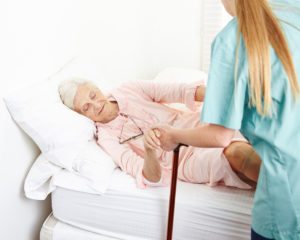Tips for Caring for an Elderly Senior through Their Stroke Recovery

Caregiver in Smithtown NY: Tips for Caring for an Elderly Senior through Their Stroke Recovery
Each year throughout the United States approximately 795,000 people suffer a stroke. For those who survive the event, the recovery period can be extremely challenging. The care that you give to your elderly loved one can be instrumental in helping them to cope with the lingering effects, rebuild their health and function, and move forward in the new chapter in their lives that can come after suffering such a serious medical emergency.
Use these tips to care for your elderly loved one through their stroke recovery:
- Stock their kitchen. What your parent eats is a critical part of their recovery and their ongoing health. It can be challenging, however, to prepare healthy meals for them every day. Get into the practice of taking one day each week or two and pre-prepare meals for them. Stock their freezer with individual servings of meals that are easy to thaw and heat up. Chop fruits and vegetables for easy salads and snacks. Pre-cook simple foods such as chicken and pasta so that they can put together quick lunches and snacks. This will help to ensure that they have access to healthy, satisfying meals without the stress.
- Create a care plan for them. Organization and planning are critical when it comes to giving your elderly loved one the care that they need. When you have a plan, you are better able to organize your days, plan other activities and events, and structure your efforts to ensure that everything is handled properly.
- Balance your care and support. It is vital that you recognize that while seniors who have suffered a stroke will experience physical challenges and limitations, these are not the only issues that they will face. Your parent will also have emotional needs that you will need to address. Ensure that you are balancing your care to include both their basic physical needs and their emotional needs, as well as encouraging them to remain compliant with their treatments, medications, and other guidelines from their doctor. Accepting help from others and considering home care for them can help you to better accomplish this goal.
If you have been struggling to give your elderly parent the care that they need as they deal with their health challenges and limitations, or you feel that they would benefit from additional care and support, now may be the ideal time for you to start home care for them. An in-home care provider can be with your aging loved one on a schedule that is customized to their individual needs and challenges so that they are able to focus on a lifestyle that is safe, healthy, comfortable, and fulfilling as they age in place. As their caregiver, this can give you a tremendous amount of peace of mind. Caring for a senior who has suffered a stroke or any other serious medical issue can be stressful and difficult, and knowing that your parent has a dedicated care provider with them can allow you to take a step back, focus on your own needs and the needs of the others in your life, and still feel confident that your parent is getting everything that they need. This can be especially important during the early period of their recovery. At this time they will need both physical and emotional support and encouragement, and the highly personalized care of a care provider can give this to them when you are unable to be with them so that together you can help them to move through their recovery in the way that is right for them.
If you or an aging loved one are considering in-home caregiver services in Smithtown, NY, please contact the caring staff at Family First Home Companions. Serving all of Long Island. Call today: (631) 319-3961
Sources
http://www.strokeassociation.org/STROKEORG/LifeAfterStroke/Life-After-Stroke_UCM_308546_SubHomePage.jsp
https://www.cdc.gov/stroke/facts.htm
http://www.strokeassociation.org/STROKEORG/AboutStroke/Impact-of-Stroke-Stroke-statistics_UCM_310728_Article.jsp#.WQZvL9Lyu01
http://www.strokeassociation.org/idc/groups/stroke-public/@wcm/@hcm/@sta/documents/downloadable/ucm_461637.pdf
- Caregiver of the Month: Kathy - April 8, 2022
- Preventing Colds and Flu in Springtime - March 2, 2022
- Caregiver of The Month: Jacqueline B - February 21, 2022
